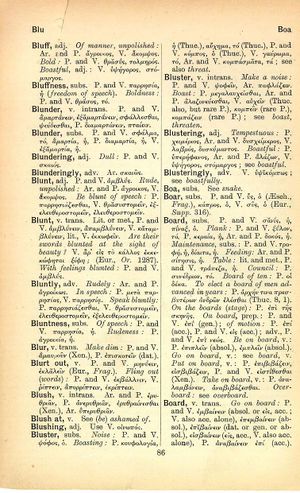blustering: Difference between revisions
From LSJ
αὐτόματοι δ' ἀγαθοὶ ἀγαθῶν ἐπὶ δαῖτας ἴασι → automatically do the noble go to the feasts of the noble
m (Woodhouse1 replacement) |
m (Text replacement - "λαβρός" to "λάβρος") |
||
| Line 3: | Line 3: | ||
===adjective=== | ===adjective=== | ||
[[tempestuous]]: [[prose|P.]] [[χειμέριος]], [[Aristophanes|Ar.]] and [[verse|V.]] [[δυσχείμερος]], [[verse|V.]] [[ | [[tempestuous]]: [[prose|P.]] [[χειμέριος]], [[Aristophanes|Ar.]] and [[verse|V.]] [[δυσχείμερος]], [[verse|V.]] [[λάβρος]], [[δυσκύμαντος]]. | ||
[[boastful]]: [[prose|P.]] [[ὑπερήφανος]], [[Aristophanes|Ar.]] and [[prose|P.]] [[ἀλαζών]], [[verse|V.]] [[ὑψήγορος]], [[στόμαργος]]; see [[boastful]]. | [[boastful]]: [[prose|P.]] [[ὑπερήφανος]], [[Aristophanes|Ar.]] and [[prose|P.]] [[ἀλαζών]], [[verse|V.]] [[ὑψήγορος]], [[στόμαργος]]; see [[boastful]]. | ||
}} | }} | ||
Revision as of 14:54, 22 June 2020
English > Greek (Woodhouse)
adjective
tempestuous: P. χειμέριος, Ar. and V. δυσχείμερος, V. λάβρος, δυσκύμαντος.
boastful: P. ὑπερήφανος, Ar. and P. ἀλαζών, V. ὑψήγορος, στόμαργος; see boastful.

